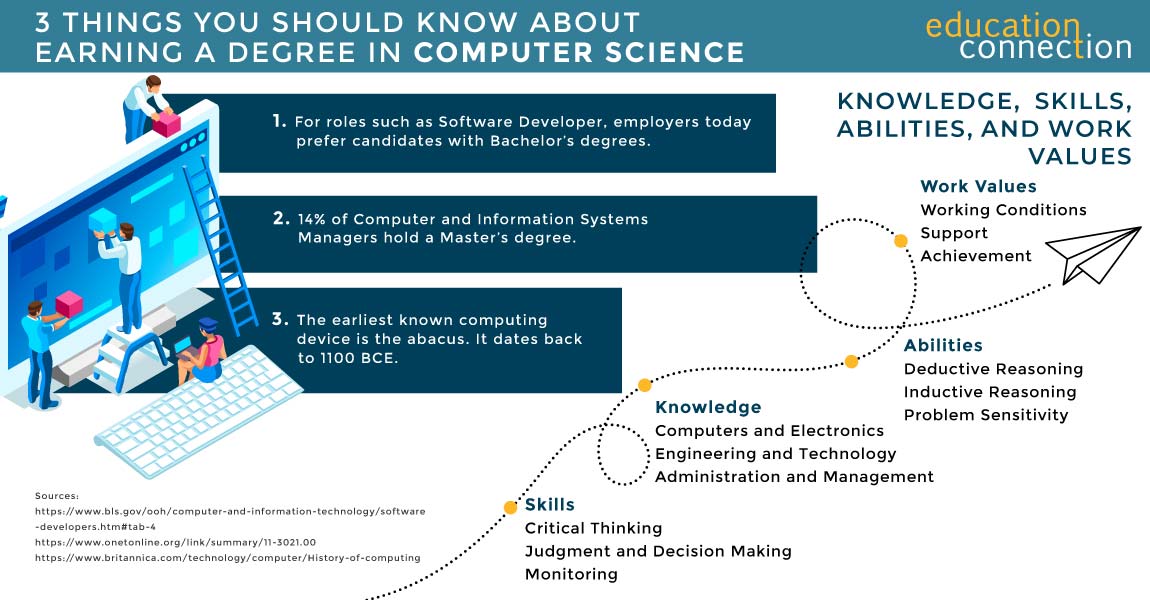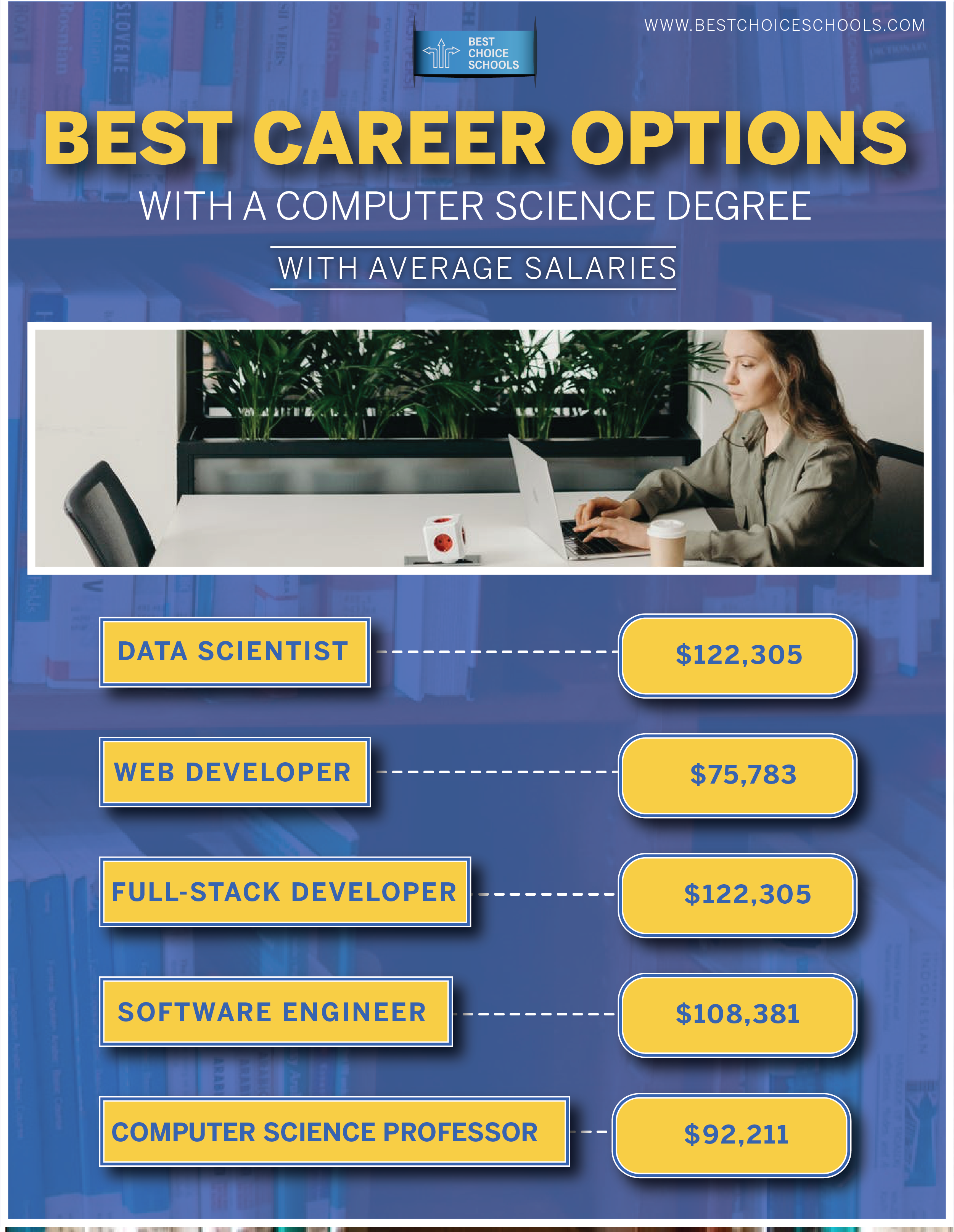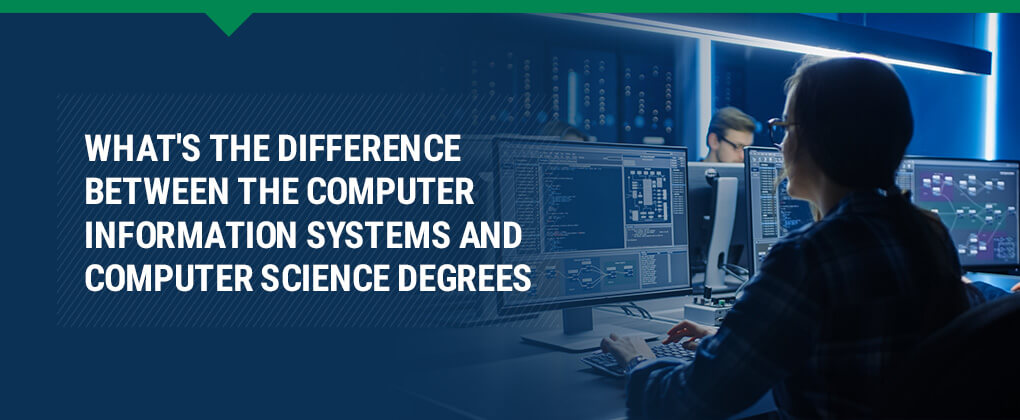Degrees in Computers offer specialized education in technology and programming. They open doors to various tech careers.
Computer degrees provide essential skills for the digital world. Students learn programming, software development, and network management. These programs often include hands-on projects and internships. Graduates can pursue careers in IT, cybersecurity, and software engineering. These degrees are valuable in today’s tech-driven job market.
With a computer degree, you gain both theoretical knowledge and practical experience. This combination makes you a strong candidate for many tech jobs. Start your journey in the tech industry with a computer degree. The future is digital, and your education can make you a part of it.
Introduction To Computer Degrees
Computer degrees are increasingly popular in today’s digital age. They offer a wide range of skills that are essential in various industries. These degrees include Computer Science, Information Technology, Software Engineering, and more. Students learn programming, algorithms, data structures, and system design.
Why Choose A Computer Degree
Computer degrees open doors to many career paths. Technology is a growing field with high demand for skilled professionals. A computer degree equips you with problem-solving skills. You also gain a strong foundation in mathematics and logic. With these skills, you can work in various industries, from healthcare to finance.
Another reason to choose a computer degree is the potential for a high salary. Many tech jobs offer competitive salaries and excellent benefits. Additionally, technology is constantly evolving. This means you will always have opportunities to learn and grow in your career.
Impact On Career Opportunities
A computer degree significantly impacts your career opportunities. Many tech companies seek candidates with a strong educational background in computers. With a computer degree, you can pursue roles like software developer, data analyst, and systems administrator. These roles are in high demand and often come with excellent job security.
Let’s look at a table of potential careers and their average salaries:
| Job Title | Average Salary |
|---|---|
| Software Developer | $105,000 |
| Data Analyst | $85,000 |
| Systems Administrator | $75,000 |
Having a computer degree also opens up opportunities for further education. Many graduates go on to pursue advanced degrees or certifications. These additional qualifications can lead to even higher-paying jobs and leadership roles.
Furthermore, a computer degree offers flexibility. Many tech jobs allow for remote work or freelance opportunities. This flexibility can lead to a better work-life balance. It also provides the chance to work on diverse projects, enhancing your skills and experience.

Credit: www.educationconnection.com
Types Of Computer Degrees
Choosing a computer degree can be challenging. Different degrees offer various career paths. Let’s explore the main types of computer degrees.
Associate Degrees
An Associate Degree in Computers usually takes two years. It covers basic computer science topics. This degree prepares you for entry-level jobs. You can work as a computer technician or support specialist.
- Duration: 2 years
- Focus: Basic computer science
- Career paths: Technician, Support Specialist
Bachelor’s Degrees
A Bachelor’s Degree in Computer Science takes four years. It includes programming, data structures, and algorithms. This degree offers more job opportunities. You can work as a software developer, systems analyst, or database administrator.
- Duration: 4 years
- Focus: Programming, Data Structures, Algorithms
- Career paths: Software Developer, Systems Analyst, Database Administrator
Master’s Degrees
A Master’s Degree in Computer Science takes about two years after a bachelor’s degree. It focuses on advanced topics like artificial intelligence and cybersecurity. This degree opens doors to senior positions and specialized roles.
- Duration: 2 years (post-bachelor)
- Focus: Advanced topics like AI, Cybersecurity
- Career paths: Senior Developer, IT Manager, Security Analyst
Doctorate Degrees
A Doctorate Degree in Computer Science is the highest level. It takes around three to five years. This degree involves deep research. Graduates often become university professors or lead research projects in tech companies.
- Duration: 3-5 years
- Focus: Research and Development
- Career paths: Professor, Lead Researcher
Specializations In Computer Degrees
Computer degrees offer many specializations. Each field focuses on different aspects of technology. Let’s explore some popular specializations in computer degrees.
Software Development
Software development focuses on designing and coding applications. Students learn programming languages like Java, Python, and C++.
- Application Development
- Web Development
- Mobile App Development
This specialization is ideal for those who enjoy creating software solutions. Graduates often become software developers or engineers.
Cybersecurity
Cybersecurity is about protecting systems from attacks. This field teaches skills to secure networks and data.
- Network Security
- Information Security
- Ethical Hacking
Cybersecurity experts help prevent cyber threats. They often work as security analysts or consultants.
Data Science
Data science involves analyzing large data sets. Students learn tools like R and SQL.
- Data Analysis
- Machine Learning
- Big Data
This specialization helps in making data-driven decisions. Graduates often work as data scientists or analysts.
Artificial Intelligence
Artificial intelligence (AI) focuses on creating smart systems. Students study algorithms and machine learning.
- Machine Learning
- Natural Language Processing
- Robotics
AI specialists develop intelligent applications. They often work in research or as AI engineers.

Credit: mwcc.edu
Skills Acquired Through Computer Degrees
Earning a degree in computers equips students with a diverse set of skills. These skills are essential in today’s technology-driven world. They prepare graduates for various roles in the tech industry. Below, we explore the key skills acquired through computer degrees.
Technical Skills
Computer degrees provide students with vital technical skills. These skills include programming, database management, and networking. Here are some specific technical skills:
- Programming Languages: Python, Java, C++, JavaScript
- Database Management: SQL, NoSQL, MongoDB
- Networking: TCP/IP, DNS, HTTP, SSL/TLS
- Operating Systems: Linux, Windows, macOS
- Web Development: HTML, CSS, React, Angular
Problem-solving Skills
Graduates develop strong problem-solving skills. They learn how to approach complex issues methodically. This involves analyzing problems, identifying solutions, and implementing them effectively. Key problem-solving skills include:
- Analytical Thinking: Breaking down problems into smaller parts
- Logical Reasoning: Understanding cause and effect relationships
- Creativity: Thinking outside the box for innovative solutions
- Debugging: Identifying and fixing errors in code
Project Management Skills
In addition to technical and problem-solving skills, computer degrees also teach project management skills. These skills are crucial for leading and managing tech projects. Graduates learn how to plan, execute, and monitor projects efficiently. Important project management skills include:
| Project Management Skills | Description |
|---|---|
| Time Management | Prioritizing tasks and meeting deadlines |
| Team Collaboration | Working effectively with team members |
| Resource Allocation | Using resources efficiently to achieve goals |
| Risk Management | Identifying and mitigating potential risks |
| Communication Skills | Conveying ideas clearly to stakeholders |
Career Paths With A Computer Degree
A computer degree opens many career opportunities. You can work in various fields and industries. Here are some career paths:
Software Engineer
Software Engineers design and develop software applications. They use programming languages like Java, Python, and C++. They solve complex problems and ensure software runs smoothly. Software Engineers work in tech companies, startups, and big corporations. They often collaborate with other developers and testers.
Data Analyst
Data Analysts interpret data to help businesses make decisions. They use tools like SQL, Excel, and Python. Data Analysts create visualizations to represent data clearly. They work in finance, marketing, healthcare, and more. This role requires strong analytical skills and attention to detail.
It Manager
IT Managers oversee a company’s technology infrastructure. They ensure systems are secure and run efficiently. IT Managers manage teams, plan IT projects, and set up networks. They often work in large organizations and government agencies. Strong leadership and communication skills are essential for this role.
Research Scientist
Research Scientists in computer science explore new technologies. They work on artificial intelligence, machine learning, and cybersecurity. Research Scientists publish papers and present at conferences. They often work in universities, research labs, and tech companies. This career requires advanced study and a passion for innovation.
| Career Path | Key Skills | Work Environment |
|---|---|---|
| Software Engineer | Programming, Problem-solving | Tech companies, Startups |
| Data Analyst | Data interpretation, SQL, Excel | Finance, Marketing, Healthcare |
| IT Manager | Leadership, Network management | Large organizations, Government agencies |
| Research Scientist | Research, Innovation | Universities, Research labs |
Top Universities For Computer Degrees
Choosing the right university for a computer degree is crucial. This decision shapes your future in technology. Top universities offer cutting-edge resources and experienced faculty. Here are some of the best institutions globally, and online options for flexible learning.
Global Institutions
Several universities worldwide are renowned for their computer science programs. These institutions provide a strong foundation in theory and practice. Below are some of the top choices:
| University | Location | Specializations |
|---|---|---|
| Massachusetts Institute of Technology (MIT) | USA | Artificial Intelligence, Machine Learning, Cybersecurity |
| Stanford University | USA | Software Engineering, Data Science, Robotics |
| University of Oxford | UK | Quantum Computing, Computational Biology, Cyber-Physical Systems |
| University of Cambridge | UK | Algorithms, Computer Architecture, Bioinformatics |
| National University of Singapore (NUS) | Singapore | Cloud Computing, Cybersecurity, Data Analytics |
Online Learning Options
Online degrees offer flexibility and convenience. Students can learn from home and at their own pace. Here are some respected online programs:
- Georgia Institute of Technology (Georgia Tech): Offers a Master of Science in Computer Science. Specializations include Machine Learning and Computing Systems.
- University of Illinois Urbana-Champaign: Provides an online Master of Computer Science. Focus areas are Software Engineering and Data Mining.
- University of London: Offers a Bachelor of Science in Computer Science. Specializations include Artificial Intelligence and Virtual Reality.
- University of California, Berkeley: Provides online professional certificates in Cybersecurity and Data Science.
These options ensure quality education is accessible to all. Whether you prefer a traditional campus or an online classroom, these institutions offer excellent computer degrees.
Industry Demand For Computer Graduates
The industry demand for computer graduates has never been higher. With technology evolving rapidly, professionals with computer degrees are in high demand. Let’s dive into the current job market trends and future growth projections for computer graduates.
Current Job Market Trends
Today’s job market shows a significant need for computer experts. Companies across various sectors are seeking tech-savvy professionals. Here are some key trends:
- Increased demand for software developers and engineers.
- Growth in cybersecurity roles due to rising threats.
- High demand for data scientists to analyze big data.
- Expansion of AI and machine learning positions.
- Need for cloud computing specialists.
These trends show that computer graduates have diverse career paths. Employers are willing to offer competitive salaries and benefits to attract top talent.
Future Growth Projections
The future looks bright for computer graduates. Here are some projections to consider:
| Role | Projected Growth Rate (2023-2030) |
|---|---|
| Software Developers | 22% |
| Cybersecurity Analysts | 31% |
| Data Scientists | 28% |
| AI Specialists | 35% |
| Cloud Engineers | 24% |
These figures highlight the growing need for computer professionals. Graduates can expect a wealth of opportunities in the coming years. The tech industry is set for continuous expansion, making it a promising field for new graduates.
Benefits Of A Computer Degree
Earning a degree in computers offers numerous advantages. This field is constantly evolving. Graduates enjoy a range of benefits that make their education worthwhile.
High Earning Potential
A computer degree often leads to lucrative jobs. Many roles in this field offer high salaries. Graduates can expect to earn well above average. Here is a quick look at some potential earnings:
| Job Title | Average Salary |
|---|---|
| Software Developer | $105,000 |
| Data Scientist | $120,000 |
| IT Manager | $135,000 |
Job Security
The demand for computer professionals is high. This means job security is strong. Technology is integral to every industry. Graduates often find stable and secure jobs. Here are some key points:
- High demand for tech skills
- Low unemployment rates in tech
- Many opportunities for advancement
Diverse Career Options
A computer degree opens up a variety of career paths. Graduates can work in many fields. Some popular options include:
- Software Development
- Cybersecurity
- Data Analysis
- Network Administration
- Game Development
Each career path offers unique challenges and rewards. The skills learned in a computer degree are versatile. This allows graduates to explore different industries and roles.
Challenges In Pursuing A Computer Degree
Pursuing a degree in computers is a challenging journey. Students face many hurdles. The field demands dedication, adaptability, and a strong foundation in both theory and practice. Let’s explore some of the primary challenges students encounter.
Intensive Coursework
The coursework in computer degrees is very demanding. Students often juggle multiple subjects at once. This includes programming languages, data structures, algorithms, and more. Each subject requires a deep understanding and hours of practice.
Students may also need to work on complex projects. These projects test their knowledge and skills. Meeting deadlines can be tough, especially with other commitments. Managing time effectively is crucial for success.
Keeping Up With Rapid Changes
The tech world evolves quickly. New technologies and frameworks appear regularly. Students must stay updated with the latest trends. This can be overwhelming but is essential for staying relevant in the field.
Regularly reading tech blogs, attending workshops, and taking online courses can help. It ensures students do not fall behind in their knowledge.
Balancing Theory And Practice
A computer degree involves both theoretical and practical learning. Understanding the theory is crucial for foundational knowledge. However, applying this theory in real-world scenarios is equally important.
Students need to balance their study time between books and hands-on projects. Practical experience often makes the theoretical concepts clearer. Internships and lab sessions are excellent opportunities for this balance.
| Challenge | Solution |
|---|---|
| Intensive Coursework | Effective time management and regular practice |
| Keeping Up with Rapid Changes | Stay updated with tech blogs and online courses |
| Balancing Theory and Practice | Engage in hands-on projects and internships |
Facing these challenges can be daunting. But with the right approach and resources, success is achievable.

Credit: www.bestchoiceschools.com
Frequently Asked Questions
What Are The Types Of Computer Degrees?
Computer degrees include Computer Science, Information Technology, Software Engineering, and Cybersecurity. Each focuses on different aspects of computing and technology.
What Can You Do With A Computer Degree?
A computer degree opens up career opportunities in software development, IT management, cybersecurity, and data analysis.
How Long Does It Take To Get A Computer Degree?
Typically, it takes four years to earn a bachelor’s degree in computers. Advanced degrees may require additional years.
Is A Computer Degree Worth It?
Yes, a computer degree is worth it. It offers high demand, competitive salaries, and diverse career opportunities.
Conclusion
Earning a computer degree opens many career opportunities. It offers skills in demand. You’ll gain knowledge in programming, networking, and cybersecurity. This can lead to high-paying jobs. Pursue a degree in computers to secure your future. Start your journey in technology today.

